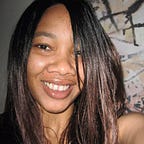Conversations With Poets We love: Daphne Goltlieb
Daphne Goltlieb is the author of five books of poetry, one nonfiction book, one graphic novel, one book of short stories, and two anthologies. She is also the winner of Acker Award for Excellence in the Avant-Garde, the Audre Lorde Award for Poetry, and the Firecracker Alternative Book Award. I recently got to ask Daphne some questions for this edition of Conversations with Poets we love.
Uzomah: In your poems, the woman is not portrayed as the damsel in distress, no matter how bleak the situation. how and what writing techniques do you use to encourage and support this narrative?
Daphne: That’s a really good question and really complicated question. I don’t have a great answer to that except to say it’s out in the world. Staying awake is key, I think. Really looking. Because the stories are already there (as I think you imply). It’s just a matter of figuring out the right place to stick the wrench.
U: Why is it important to give women a literary backbone in these times more than ever?
D: I think that women of color and transwomen, in particular, need to pick up pens or laptops or spray paint and get louder. I think I would rather that someone had a literary ulna and radius than a backbone — and carpals, and all the other bones you need to write.
U: How has poetry exposed you to other types of writing, and which types of writing?
D: I think the biggest way that I’m exposed to other types of writing is through knowing other writers. I have friends who are sci-fi writers, romance writers, nonfiction writing, and playwrights. So that helps broaden my horizons. Also, poets don’t always write poems, right? I have a graphic novel, 2 anthologies, a book of nonfiction, and a book of fiction out So through knowing people who cross boundaries, I find exciting new things.
U: Do you remember the first poem you had published? Who published it? Would you go back and change anything?
D: I was 8. It was about a hippo that danced ballet. It was published in the local library’s journal. There’s a copy of it in my closet somewhere, slowly turning to dust (if it’s not all dust already). I would probably like to change everything. I guess it’s too late now.
U: What poet of the past would you like to have 21 questions with and why?
D: I’m going to decide that by “past”, you mean “dead” because I would love to talk to Justin Chin again. I miss him. Even though it’s been a few years now, it still doesn’t make sense to me that he’s dead, and he shouldn’t be dead, but he is. At least he left so many amazing poems for us.
U: How do you want your poetry and spoken word performances and other writings to be regarded?
D: Highly.
U: How has having a city such as San Francisco as your backdrop been for your writing given its literary history?
D: San Francisco raised me. I moved here when I was just a pup, during the high plague years of AIDS. The city was vibrating with energy and tension and grief and defiance. So ACT-UP was more of an influence than Kerouac, and ersatz club kid culture more than Danielle Steel. More importantly, is that there’s a certain something to living on the edge of the world, particularly when you know it could overturn at any moment. Back before tech, it was the epicenter of anywhere I wanted to live my life.
U: What are characteristics about yourself that writing has revealed to you?
D: That I’m obsessive. I can lose hours to doing research and taking notes for a piece, or writing. That I don’t write for myself — I write for the community. I’m not really interested in sitting in a room and talking to myself, although I’m sure it’s fun. Writing has revealed my love of precision, to do this impossible thing and put the right things together and somehow someone puts those things together and comes up with something similar to what I meant. It’s like psychic teleportation or something.
U: How would you describe your writing style?
D: Sweetened condensed milk and a buzzsaw.
U: Please describe why writing is so powerful a tool in expressing oneself for you?
D: While it’s effective to scream at random people on the street, there can be unintended and unpleasant consequences. My leotard shrunk in the laundry. I tried semaphore, but I spoke flag with an accent. Morse code didn’t work because everything sounded like 80s music to me (dit dit dit) and my leotard had shrunk. I kept huffing the paint and they took it away from me. My kazoo cracked. Fortunately, there was writing.
U: How can writing help LGBTIQA and QTPOC be able to address issues that place them in conflict when declaring who they are to themselves and to society?
D: There are many, many ways. Writing for your own pleasure and to know yourself is always useful (and sometimes gratuitously painful). I kind of think that it’s like that butterfly in Japan thing — that we bring things into being, we make ways of being. But it’s when we can see, hear, and share that we become a movement. We are a sudden and ephemeral community and we don’t have to apologize. We have to write the books we’ve needed to read that didn’t exist. That’s all I’ve ever wanted to do.
U: What are some future projects you are working on?
D: I have a novel coming out this year called 1001, and I think it’s the queerest book I could write about heterosexuals. It’s about anonymous sex, Arabian Nights, and how we become the stories we consume. Other than that? Graduate school. Maybe you’ll hear from me after 2023…
